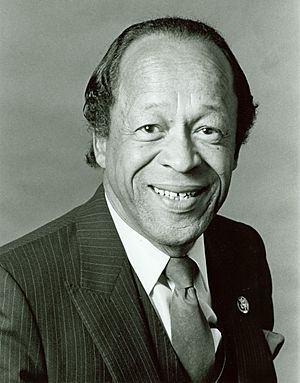Gus Savage facts for kids
Quick facts for kids
Gus Savage
|
|
|---|---|
 |
|
| Member of the U.S. House of Representatives from Illinois's 2nd district |
|
| In office January 3, 1981 – January 3, 1993 |
|
| Preceded by | Morgan F. Murphy |
| Succeeded by | Mel Reynolds |
| Personal details | |
| Born |
Augustus Alexander Savage
October 30, 1925 Detroit, Michigan, U.S. |
| Died | October 31, 2015 (aged 90) Olympia Fields, Illinois, U.S. |
| Political party | Democratic |
| Spouse | Eunice King (1946-81; her death) |
| Children | Thomas James, Emma Mae |
| Alma mater | Roosevelt University Chicago-Kent College of Law |
| Military service | |
| Branch/service | United States Army |
| Years of service | 1943–1946 |
Augustus Alexander "Gus" Savage (October 30, 1925 – October 31, 2015) was an American politician, businessman, and newspaper publisher. He was a member of the Democratic Party and served in the United States House of Representatives for Illinois.
Contents
Life and Career
Gus Savage was born in Detroit, Michigan. He later graduated from Roosevelt University in Chicago. He served in the United States Army from 1943 to 1946 during World War II.
Newspaper Publisher
After his military service, Gus Savage worked as a journalist from 1954 to 1979. He owned several weekly community newspapers in the Chicago area. One of his well-known papers was the South End Citizen. His company, the Chicago Citizen Newspaper Group, grew to be the largest Black-owned chain of weekly newspapers in the Midwest. It reached many readers, with a circulation of 121,000 copies.
Entering Politics
Gus Savage began his political journey in 1948. He started as an organizer for the Progressive Party. He ran for a seat in the United States House of Representatives in 1968 and 1970. Although he did not win the Democratic primary election those times, he was elected to the House in 1980.
He represented Illinois's 2nd District, which covers parts of Chicago's South Side. He served six terms in Congress, from January 1981 to January 1993.
Key Actions in Congress
In 1983, Gus Savage joined seven other members of Congress. They worked together to propose a resolution to impeach President Ronald Reagan. This was after the sudden invasion of Grenada.
During his time in Congress, Savage was the chairman of the House Subcommittee on Public Buildings and Grounds. In 1992, he helped bring attention to an important historical site. This site was the African Burial Ground in New York City. Thanks to his efforts, excavation and construction at the site were temporarily stopped. This allowed for more evaluation of the site's importance. The site was later recognized as a National Historic Landmark in 1993 and a National Monument in 2006.
Later Political Career
Gus Savage often faced challenges in his political career. He never won a primary election with more than 52% of the vote. This was important because his district was mostly Democratic, so the primary election was usually the real contest.
For the 1992 election, his district boundaries changed. The new district included more areas in Chicago's south suburbs. These were areas that Gus Savage did not know well, and the voters there did not know him. He ran against Mel Reynolds, who had challenged him before. Gus Savage lost the 1992 election to Mel Reynolds.
Death and Legacy
Gus Savage passed away on October 31, 2015. This was just one day after his 90th birthday. He celebrated his birthday with his closest friends and family. He is remembered by his son, Thomas Savage, his daughter, Dr. Emma Savage, and his grandchildren.
See also
 | Aaron Henry |
 | T. R. M. Howard |
 | Jesse Jackson |

